
|
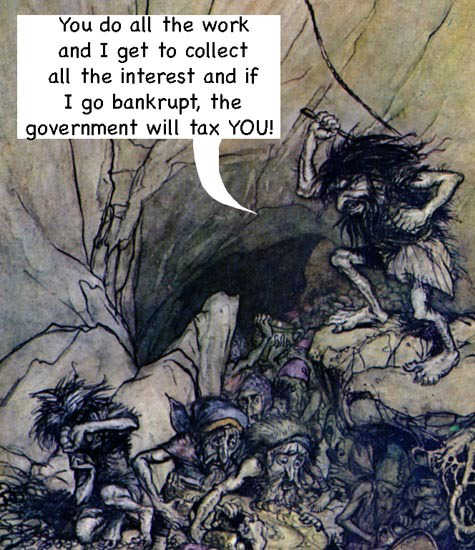
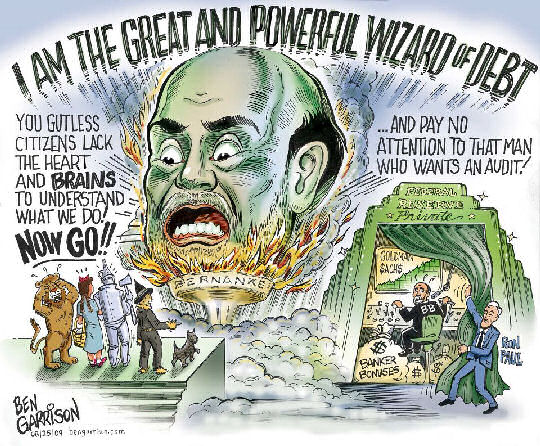
The chairman of the
Federal Reserve Board Ben Salom Bernanke suggests the US turn over
sovereignty to the Bank of
International Settlements.
Ben
Salom Bernanke suggests the US take the advise of the Financial
Stability Forum, a small secretariat of the Bank for International
Settlements in Basel,
Switzerland.
"I will not say much about the
international dimensions of the issue
but will take as self-evident that, in light of the global nature of financial
institutions and markets, the reform of
financial regulation and supervision should be coordinated internationally to
the greatest extent possible." - Ben Salom
Bernanke speaking to the Council on
Foreign Relations 03/10/09
"Economists" work at selling the
public the idea that recessions and/or depressions are a natural part of what
they call the "business cycle".
This is simply not the
truth.
Recessions
and depressions occur due to manipulation of the
money supply by the central banks
through credit.
Central banks are privately owned and operated.
Central banks refuse the scrutiny of
state regulators - no one knows whose money (if there actually is reserves) -
the central banks use and no one
has ever been allowed to audit the fungible
assets in their database
spreadsheets.
55 BC "The budget should be
balanced, the Treasury should be
refilled, public debt should be
reduced, arrogance of
officials should be tempered and controlled, and the
assistance to foreign lands should
be curtailed lest Rome become bankrupt.
People must again learn to
work, instead of living
on public assistance." - Cicero
51 BC Gaius Julius Caesar becomes the most powerful politician
in the Roman Republic through a string of military victories in the Gallic Wars
in which the wealth of the Celts is
carted off to Rome.
44 BC
Caesar is
assassinated on the Ides of March by a group of rebellious senators led by
Brutus and Cassius who stab him to death.
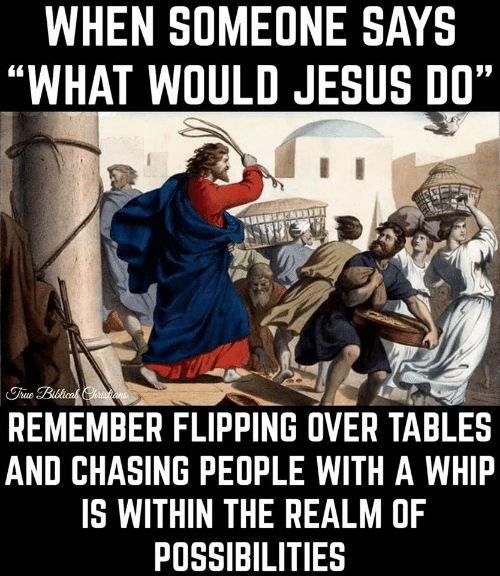
33 AD Tiberius creates a
financial crisis by decreed - 1⁄3 of every
senator's fortune be invested in Italian land.
Jesus uses physical force -
the only time throughout his ministry - to throw the soulless money changers
out of the Temple.
Hebrews could only pay their temple tax with a
half-shekel, a half-ounce of pure silver, about the size of a quarter.
The half-shekel was the only pure
silver coin of assured weight
at that time without the image of
a pagan Emperor.
Jesus threw the soulless
money changers out as the wealth extraction monopoly on
these coins violated the
sanctity of the Temple.
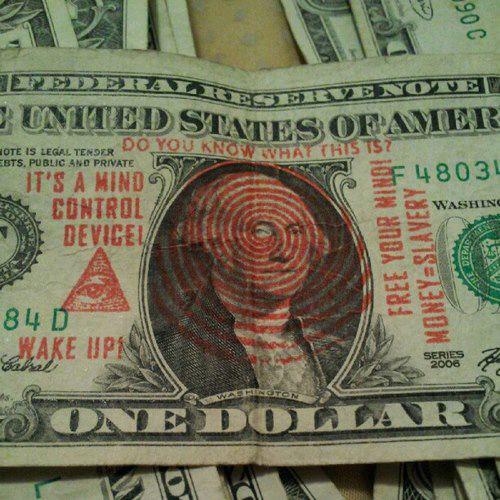
1024 Medieval England's
money supply is controlled by
goldsmiths.
The concept of paper
money used for trade arrives from China.
Paper money is a paper promissary note issued
by an Archon or Patrician.
A promissary note contains a written
promise to pay a stated sum to a specified entity, or to the bearer at a
specified date or on demand.
A promissary note is a bond carried by the
holder or bearer - a bearer
bond.
The first promissary notes, receipts for gold or silver
deposited, are contracts for a gold delivery to a specified party within or at
an ascertained time.
Bearer bonds, also promissary notes, are readily
transferable contracts for delivery made to an unidentified bearer.
This
breaks the tie to any identifiable deposit of
precious metal.
Recognizing only
a fraction of depositors of gold ever
demand gold at once they began to loan out
paper promissary notes made payable
to the bearer.
Loaning out more money
than one possess', fractional
reserves, is the same as
printing money or
owning a money tree orchard.
Banking families intermarried to
build an international dynasty.
1100 King
Henry I creats a new form of currency - a "talley stick."
The talley
stick currency is in existence for 726 years until 1826 even though other
currencies came and went, running alongside the talley sticks.
The
talley stick was a stick of polished wood into which notches were cut along one
side, to indicate the denomination of money the stick represented.
The
stick was then split lengthwise through the notches, so that both pieces had a
record of the notches.
The King kept ½ to protect against
counterfeiting and the other half was circulated into the economy as money.
The talley stick was the most successful money system in history, as
the King demanded that all the King's taxes had to be paid in, "talley sticks,"
so this increased their circulation and acceptance as a legitimate form of
money.
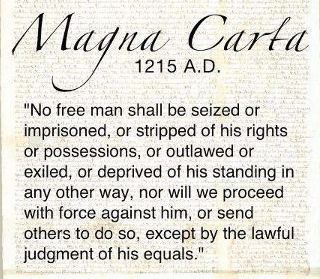
1215 "If
one who has borrowed from the Jews any sum, great or small, die before that
loan be repaid, the debt shall not bear interest while the heir is under age,
of whomsoever he may hold; and if the debt fall into our hands, we will not
take anything except the principal sum contained in the bond.
If anyone
die indebted to the Jews, his wife shall have her dower and pay nothing of that
debt; and if any children of the deceased are left under age, necessaries shall
be provided for them in keeping with the holding of the deceased; and out of
the residue the debt shall be paid, reserving, however,
service due to feudal
lords; in like manner let it be done touching debts due to others than
Jews." - Magna
Carta
The formulation of Magna Carta in England is not an isolated
event.
Many similar statements of law are being made on the Continent.
In form and content, they run roughly parallel to the English document,
though none is identical.
Among the most nearly contemporary were the
Liber Augustalis, containing the Constitutions of Melfi issued in
1231 by the Emperor Frederick II for the kingdom of Sicily, and the Golden
Bull of Zagreb, issued by King in 1242 to the towns and cities of Slavonia
and Hungary."
There were also many others.
Among the best known
of them are Philippe de Beaumanoir's Customs of the Beauvaisis in
France, the Siete Partidas in Castile, the Sachsenspiegel in
Germany, the Usatges of Barcelona from Catalonia, and the Laws of
King Magnus Ladulas in Sweden.
1225
St. Thomas Aquinas argues that the charging
of interest is wrong because it applies to "double charging," charging for both
the money and the use of the money.
This concept followed the
teachings of Aristotle that
taught the purpose of currency was to serve the members of the social culture
by facilitating the exchange of goods and services.
Interest is
contrary to reason and justice as it put an unnecessary burden on the use of
money simply a way to facilitate trade in resources or services.
Church
law in Middle Ages Europe forbade the charging of interest on loans making it a
crime called, "usury."
Christians were not
allowed by their religion to charge interest on any money lent as this was
considered usury.
The Jews were not so incumbered.
"Usury is the practice
of lending money at excessive interest
rates. This has for
centuries caused great misery and poverty for Gentiles. It has brought
strong condemnation of the Jews!" - Diodorus Siculus Greek historian
"The Jewish
usurers are fast-rooted even in
the smallest villages,
and if they lend five gulden they require a security of six times as much.
They charge interest, upon
interest, and upon this again interest, so that
the poor man loses everything
that he owns." - Desiderius Erasmus
"Jewish usurers bleed the poor
to death and grow fat on
their substance." - Bernardino de Feltro
In the
Mishnah of Moses Maimonides
in the the Book of Judgments Jews are required to not charge interest to
other Jews but to charge interest to a Gentile and to press the Gentile for
payment.
"Turn to the pages of the Talmud and you will find that they
made an art of lending money. They were taught early to look for their
chief happiness in the
possession of money. They fathomed all the secrets that lay hid in money.
They became Lords of Money and Lords of
the World." - Werner Sombart
1275 Edward
I of England issues the Statute of the Jewry outlawing the practice of
usury.
"Jews have never, like other people, gone into a wilderness and
built up a land of their own.
In England in the 13th century, under
Edward I, they did not take advantage of the offer by which Edward promised to
give them the very opportunity Jews had been crying for, for centuries."
After imprisoning the entire Jewish population, in his domain for
criminal usury, and debasing the coin of the realm; Edward, before releasing
them, put into effect two new sets of laws.
The first made it illegal
for a Jews in England to loan money at interest.
The second repealed
all the laws which kept Jews from the normal pursuits.
Under these new
statutes Jews could even lease land for a period of 15 years.
Edward
advanced this as a test of the Jews
sincerity when he
claimed that he wanted to work like other people.
If they proved their
fitness to live like other
people inference was that Edward would let them buy land outright and admit
them to the higher privileges of citizenship.
Did the Jews take
advantage of Edward decree?
To get around this law against usury,
they invented such new methods of skinning the
peasants and the nobles that the
outcry against them became greater than ever.
And
Edward had to expel them to
avert a civil war.
It is not
recorded that one Jew took advantage of the right to till the soil." -
Samuel
Roth*
1381 Peasants Revolt Raging mobs seized
tax-enforcing judges and clerks and paraded their heads, minus the rest of
them, on pikes through the streets of English towns.
Jails and
buildings where tax records are stored are destroyed.
Large numbers of tax bureaucrats are killed
in often creative ways.
The rebels amass an army, assault the
capital, seize the Tower of London and kill the king's two highest finance
officials, the Lord Chancellor and the Lord High Treasurer.
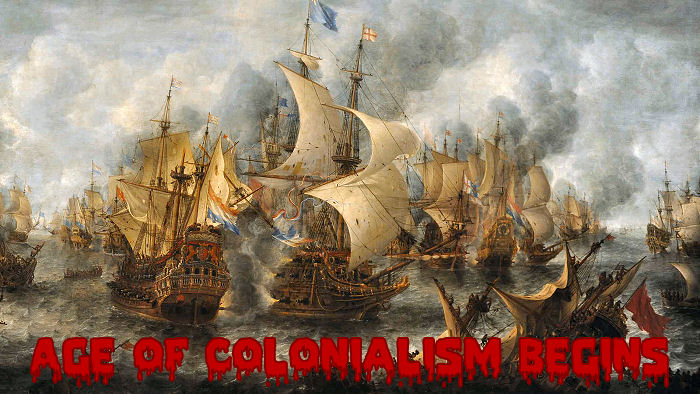
1492 Ferdinand and Isabella of Spain sign a
decree expelling all Jews who refuse to
convert to Christianity.
A considerable number move to
Portugal.
Many within
the migrant Jewish community
in Portugal proceeded to become wealthy
in commercially successful Portuguese port cities.
Being forced to
move, Jewish families remain
mobile and develop international family agencies for growing
brokerage houses
involved with shipping.
Family networks of mobile Jewish "lombards"
migrate from port city to city during the Spanish Inquisition and forge
international networks.
Most European cities
still have a street named Lombard street after the pawn shop that once housed
there.
In Dutch, the name for a pawn shop is still lommerd, and this
etymology persists in
the names of various banks (unless named after some family).
In
Polish and
Russian, a pawn shop is called simply
lombard.
Lombard banking refers to the historical use of the term
'Lombard' for a pawn shop in the
Middle Ages, a type
of banking that originated with the prosperous northern Italian region of
Lombardy.
In France the Lombards became synonymous with the Cahorsins.
Cahors became prominent in the Middle Ages as a major banking center of
medieval Europe.
Cahorsin money lenders were infamous for charging
interest on their loans.
Antwerp was foreigner-controlled, which made
the city very international, with merchants and traders from Venice, Dubrovnik
Republic, Spain and Portugal.
Antwerp had a policy of toleration,
attracting a Haredi Jewish community.
The Haredi, or
Hasidic, lived concentrated in the
city center in an area close to what later became the Antwerp Central railway
station.
This neighborhood is also sometimes known as "Jewish
Antwerp".
Its main attraction was its close proximity to the diamond
bourse, where a large part of the Haredi community work
cutting and polishing
diamonds.
The Portuguese began using Antwerp as an outlet for their
Asian pepper and spice imports, and the Germans bring copper and
silver.
1500 Charles of Habsburg, heir to the
Netherlands via his grandmother Mary, is born in Ghenti.
Charles is
raised in the Netherlands and spoke fluent Dutch, French, and Spanish, along
with some German.
1506 Charles becomes lord of
the Netherlands.
1509 King Henry VIII succeeds
King Henry VII to the throne.
Under King Henry
VIII the Church of England separates from
Roman Catholicism, whose
law prevents the charging of interest on money.
King Henry VIII relaxes
the laws regarding usury and the soulless money changers waste no time by
flooding the economy with gold and silver coins.
"No people under the
sun are more greedy than they are, than
they have been and always will be, as one can see from their accursed usury.
The Princes and authorities
sit and snore with open mouths and let the Jews take, steal and rob what they
want out of their open purses and chests.
They permit themselves and
subjects to be sucked dry by
the Jews' usury, and make themselves, with their own money, beggars in
their own State.
The Jews have got our money and property, and are
therefore our masters in our own land." -
Martin Luther
1543
1516 Charles of Habsburg inherits the
kingdoms of Spain, which have become a worldwide empire with the Spanish
colonization of the Americas.
1519 Charles
inherits the Archduchy of Austria.
1530 Charles
is elected Holy Roman Emperor.
Although Frisia and Guelders offered
prolonged resistance under Grutte Pier and Charles of Egmond respectively,
virtually all of the Netherlands had been incorporated into the Habsburg
domains by the early 1540s.
July 10, 1553 Jane
Grey the great-granddaughter of Henry VII through daughter Mary, and a second
cousin of Edward VI ascends the throne.
She has an excellent humanist
education and a reputation as one of the most learned young women of her
day.
"For when I am in
the presence either of father or mother, whether I speak, keep silence,
sit, stand or go, eat, drink, be merry or sad, be sewing, playing, dancing, or
doing anything else, I must do it as it were in such weight, measure and
number, even so perfectly as God made the world; or else I am so sharply
taunted, so cruelly threatened, yea presently sometimes with pinches, nips and
bobs ... that I think myself in hell." - Lady Jane Grey
July 19 Privy Council of England suddenly proclaims
Mary Tudor as queen deposing Jane.
Jane Grey nee Dudley's primary
supporter, her father-in-law the Duke of Northumberland, is
accused of treason and
executed.
Jane and her
husband are executed when her father, Henry Grey, 1st Duke of Suffolk, becomes
involved with Wyatt's rebellion.
Queen Mary I succeeds Lady Jane Grey's
nine day reign on the throne in England.
During her reign, Queen Mary I,
a staunch Catholic, tightens the usury laws.
Mary was the only child of
Henry VIII by his first wife, Catherine of Aragon, to survive to
adulthood.
The soulless money
changers, not amused, hoard gold and silver coins thus creating economic
contraction.
1554 Mary, the first queen regnant
of England, marries Philip II of Spain, becoming queen consort of Habsburg
Spain on his accession in 1556.
Bloody Mary has over 280 religious
dissenters burned at the stake in the Marian persecutions.
1556 Charles passed on his throne to his son Philip II of
Spain.
Charles had been seen as a ruler sympathetic to the needs of the
Netherlands.
Philip was raised in Spain and spoke neither Dutch nor
French.
During Philip's reign, tensions flared in the Netherlands over
heavy taxation, suppression of Protestantism, and centralization efforts.
The growing conflict leads ultimately to the war of
independence.
1558 Queen Elizabeth I succeeds
Queen Mary I, her half sister, to the throne in England.
During her
reign Queen Elizabeth I takes control of the money supply by issuing gold and silver
coin.
August 22, 1567 Fernando Álvarez de
Toledo, 3rd Duke of Alba, marched into Brussels at the head of 10,000
troops.
A large number of executions led the court to be nicknamed the
"Blood Court" in the Netherlands, and Alba to be called the "Iron Duke".
Rather than pacifying the Netherlands, these measures helped to fuel
unrest.
1566 Calvinists begin the iconoclastic
fury (Dutch: Beeldenstorm) across the Netherlands.
1572 Queen Elizabeth I ousted the Gueux, known as Sea Beggars,
from the English harbors in an attempt to appease the Spanish king.
The
Gueux under their leader Lumey captur the undefended town of Brielle.
In securing Brielle, the rebels gain a foothold, and a token victory in
the north.
Protestants spread across the Low Countries rebel once
more.
1573 William of Orange converts to
Calvinism.
1585 With the Fall of Antwerp, scores
of merchants and Calvinist craftsmen flee the south for the relative security
of the Northern Netherlands.
Northern Netherlands is predominantly rural
compared to the urbanized southern provinces.
1588 Dutch Republic founded.
Dutch Golden Age begins.
1592 Several William Shakespeare plays appear on the London
stage.
Scholars refer to the years between 1585 and 1592 as
Shakespeare's "lost years"; likely the period
he 'developed'
the material for his plays.
"William Shakespeare is well known to
have been something of a magpie when it came to plots and characters -
borrowing (and elevating) stories and turns of phrase from writers ranging from
Giovanni Boccaccio to Christopher Marlowe." - Thu-Huong Ha
Shakespeare
plagiarized a manuscript titled "A Brief Discourse of Rebellion and
Rebels," written in the late 1500s by George North, a minor figure in the
court of Queen Elizabeth, who served as an ambassador to Sweden.
Plagiarism Software Unveils a New Source for 11 of Shakespeare's
Plays
"There are still manuscript sources out there that have not
been published that Shakespeare may have used, and it shows that we don't know
everything about the origins of the Shakespeare canon." - Dennis
McCarthy
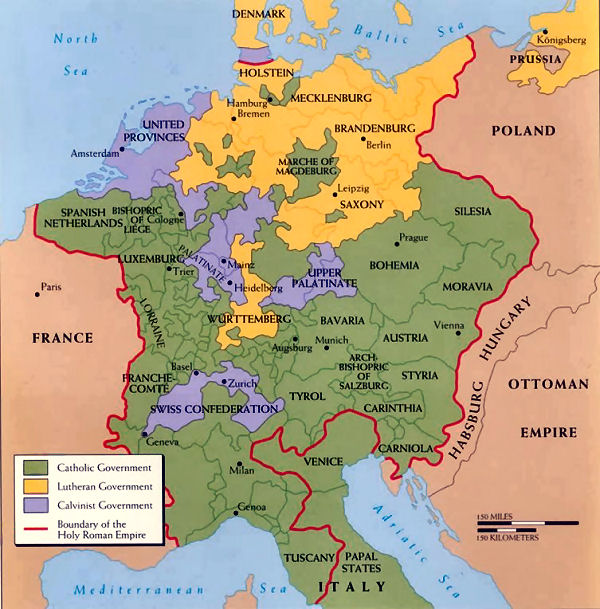
1609 The
soulless money changers in the Netherlands establish the first central bank in
Amsterdam.
The central bank of Amsterdam finances Oliver
Cromwell.
1649
Oliver Cromwell overthrows
King Charles I putting him to death.
Plunged into a costly series of
wars over the next few decades Great Britain sinks
deep into debt.
The bankers
foreclose on a square mile of
property in the heart of London which becomes the
City of London, an international economic
center.
Following a series of
squabbles with the Stuart Kings, Charles II (1660 - 1685) and James II
(1685 - 1688) the bankers conspire with counterparts in Amsterdam to
finance an invasion
led by William of Orange, Netherlands.
1689
William of Orange ascends
to the throne in England as William
III .
1694 King
William III orders the British Treasury to borrow £ 1,250,000.
In
return King William III issues the international bankers a Royal Charter for a
new central Bank of England.
This Royal Charter permits the
international bankers to
consolidate the British national
debt with a £ 1,250,000 loan by securing
payments of interest and principal
through direct taxation of
the people.
The Royal Charter forbids private goldsmiths from
storing gold and issuing paper promissary notes made payable to the
bearer.
The Bank of England, a
privately chartered joint stock
incorporation named to deceive
the general public, tenders shares for start up capital.
The
private investors purportedly tender £ 1,250,000 in gold coins to buy
their shares in the central bank. £ 750,000 is registered.
Despite the £ 500,000 shortfall the central bank is
chartered.
"The Bank hath benefit of interest on all monies which it
creates out of nothing." - William Paterson founder Bank of England
The
Bank of England amounted to nothing less than the legal counterfeiting of a
national currency for private gain.
Any country falling under a
private central bank controlled system eventually amounts to nothing more than
a plutocracy.
Bank of
England attacks the talley stick system.
1698 British Treasury owes £16,000,000 to the Bank of
England.
International
bankers have gained control of the economy of England.
Suppose the
money in circulation in a country is £5,000,000.
A central bank
is set up and prints another £15,000,000.
The value of the
initial £5,000,000 in circulation is now only 25% of the currency in
circulation.
Bank controls 75% of the currency in circulation with
£15,000,000 in loans.
This causes
asset price inflation
accompanied by a reduction in value of money
held in common due to the economy being flooded with new money.
Asset price inflation is an economic phenomenon
denoting a rise in price of assets, as opposed to ordinary goods and
services.
Typical
assets are financial instruments such as
bonds, shares, and their derivatives, as
well as real estate and other capital goods.
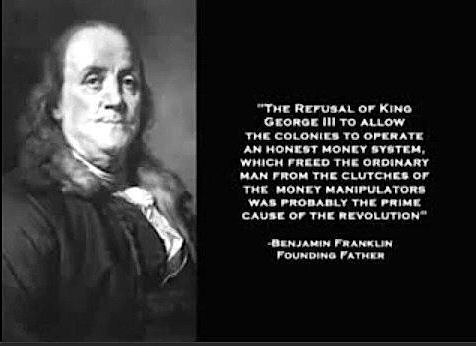
"It was Alexander Hamilton, the first secretary of
the treasury, who compromised the new nation, through what he admitted was
"corruption," by giving the wealthy speculators in Revolutionary War bonds the
benefit of federally-sponsored redemption and then by establishing the First
Bank of the US. This early drift toward elitist rule was opposed by Thomas
Jefferson, James Madison, and others." - Richard C. Cook1764
Benjamin Franklin is
asked by officials of the Bank of England to explain
the prosperity of
American colonies.
"That is simple. In the Colonies we issue our own
money. It is called Colonial Scrip. We issue it in proper proportion to
the demands of trade and
industry to make the products
pass easily from the producers to the consumers. In this manner creating for
ourselves our own paper money, we control its
purchasing power, and we have no
interest to pay." - Benjamin
Franklin
British Parliament passes the Currency
Act of 1764.
The Currency Act of 1764 prohibits
colonial officials from issuing their own money and orders them to pay all
future taxes in gold or silver coins.
Due to the prohibition on the
issuance of paper money by the colonies under the Currency Act of 1764 -
real estate owners who could not pay their
taxes lost their land.
John Morton, a sheriff of Chester County in
Pennsylvania who would sign the
Declaration of
Independence, seized 180 farms between 1766 and 1769.
"All mankind
is divided into three classes: those that are
immovable,
those that are movable, and
those that move." -
Benjamin Franklin
1769 William IX,
Landgrave of Hesse-Cassell, hires
Mayer Amschel Bauer to supervise the operation of his properties and
tax-gathering, formally designating Mayer Amschel Bauer
"Hoffaktor".
1775 Revolutionary war starts in
Lexington, Massachusetts.
10
years of British taxation has drained the colonies of silver and gold
coins.
The continental government has
no choice but to print
money.
The American money supply stands at ≈
$12,000,000.
By the end of the war the American money supply had been
expanded to nearly $500,000,000 and as a result the currency is virtually
worthless.
Colonial Scrip worked as just enough was printed to
facilitate trade.
The Constitution established a basic
currency unit, the dollar, constitutionally mandated to be a silver coin based
on the Spanish pillar dollar and to contain 375 grains of silver.
This
single provision was designed to keep the American money supply out of the
hands of the international banking cartel.
1781 Continental
Congress is desperate for monetary balance, so they allowed Robert Morris,
their Financial Superintendent, to open a privately owned central bank, in the
hope this would sort out the money problem.
Robert Morris, son of the
wealthy tobacco exporter
Robert Morris Sr., had grown wealthier during the revolution by trading in war
materials.
This first central bank in America is called the Bank of
North America, which is set up with a four year charter modeled on the Bank of
England.
The Bank of North America's charter called for private
investors to put up $400,000 of initial hard capital, which Robert Morris Jr.,
the war profiteer, found
himself unable to raise from American interests as all the gold and silver had
been sent to England as taxes.
Robert Morris uses political artifice to
have gold loaned to the government by France deposited into the new Bank of
North America to use as reserves.
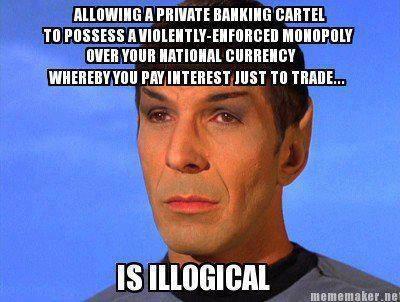
1782 Alexander Hamilton graduates law school
and goes to work as an aide to Robert Morris, who states, "a
national debt if it is not excessive will
be to us a national blessing."
"The primary definition of a central
bank is a banking system in which a single bank has either
a complete or residuary monopoly
in the note issue." - Vera C. Smith , Committee for Monetary Research and
Education
1785 Robert Morris' privately
owned Bank of North America fails to solve the problem. Continental Congress
chooses not to renew the charter.
"This institution, having no
principle but avarice, will never vary in its objective to engross all the
wealth, power and influence of the state." - William Findlay
Mayer
Amschel Rothschild moves his family home to a five story home in Frankfurt,
Germany, which he shares with the Schiff family.
A descendent of both
families, Jacob Hirsch Schiff, is
instrumental in the setting up of the Federal
Reserve 128 years later.
1787 Colonial
leaders assemble in Philadelphia to replace the
Articles of
Confederation with the Constitution.
James Madison
opposes a privately owned central bank after seeing the
exploitation of
the people by the
Bank of England.
"The
rich will strive to establish their dominion and enslave the rest. They will
have the same effect here as elsewhere, if we do not, by the power of
government, keep them in their proper spheres." - Governor Morris in a
letter to
James Madison dated
July 2nd
Alexander Hamilton, Robert Morris, Thomas
Willing, convince
the delegates to the Constitutional convention, not to give Congress the
power to issue paper money.
1788
Prominent French international bankers refuse to extend necessary short term
credit to the government, and they arrange to
have shipments of grain and food to Paris delayed which triggers the hunger
riots.
This sparks the French Revolution, in which a new
ruling class emerged, driven by violent oppression,
political and
actual terrorism.
As its violence grew so too did
discontentment with the
Revolutionary Regime and its stability and sustainability was in
question.
1791 First Secretary of the Treasury,
Alexander Hamilton, proposed a bill to the Congress calling for a new privately
owned central bank.
Alexander Hamilton manages to get a new privately
owned central bank through the new Congress.
The Bank of North America
becomes the First Bank of the US.
Baron James de Rothschild of Paris is
the principal investor.
Robert Morris controls it, Thomas Willing is
the Bank President.
 "The bill for establishing a national bank undertakes, among other
things: "The bill for establishing a national bank undertakes, among other
things:
1. To form the subscribers into a corporation.
2. To
enable them, in their corporate capacities, to
receive grants of lands; and, so far, is against the laws of mortmain.
3. To make alien subscribers capable of holding lands; and so far is
against the laws of alienage.
4. To transmit these lands, on the death
of a proprietor, to a certain line of successors changes the course of
descents.
5. To put the lands out of the reach of forfeiture, or
escheat; and so far, is against the laws of forfeiture and escheat.
6.
To transmit personal
chattels to successors, in a certain line; and so far, is against the laws
of distribution.
7. To give them the sole and exclusive right of
banking, under the national authority, is against the laws of
monopoly.
8.
To communicate to them a power to make laws, paramount to the laws of the
states; for so they must be construed, to protect the institution from the control
of the state legislatures; and so probably they will be construed.
I consider the foundation of the Constitution as laid on this ground -
that all powers not delegated to the US, by the Constitution, nor prohibited by
it to the states, are reserved to states, or the people. To take a single step
beyond the boundaries drawn around the powers of Congress, is to take
possession of a boundless field of
power, no longer susceptible of any definition.
The incorporation of
a bank, and the powers assumed by this bill, have not, in my opinion, been
delegated to the United States by the Constitution." - Thomas Jefferson,
February 15, 1791
1796 First Bank has control of the American
money supply for 5 years.
During
this time the US government has borrowed $8,200,000 from this central bank, and
prices in America have increased by 72%.
"I wish it were possible to
obtain a single amendment to our Constitution taking from the US government
their power of borrowing." -
Thomas Jefferson, Secretary of State
1798 Mayer Amschel Rothschild sends his son Nathan to England
with a sum of money equivalent to £20,000 to set up a money exchange
there.
 |
|
 |
This web site is not a commercial web site and
is presented for educational purposes only.

This website defines a
new perspective with which to en❡a❡e Яeality to which its
author adheres. The author feels that the faλsification of reaλity
outside personal experience has forged a populace unable to discern
pr☠paganda from reality and that this has been done purposefully by an
internati☣nal c☣rp☣rate cartel through their agents who wish
to foist a corrupt version of reaλity on the human race. Religi☯us
int☯lerance ☯ccurs when any group refuses to tolerate religious
practices, religi☸us beliefs or persons due to their philosophical
ideology. This web site marks the founding of a system of philºsºphy
nªmed The Truth of the Way of the Lumière Infinie - a
ra☨ional gnos☨ic mys☨ery religion based on reaso🐍
which requires no leap of faith, accepts no tithes, has no supreme leader, no
church buildings and in which each and every individual is encouraged to
develop a pers∞nal relati∞n with the Æon through the pursuit
of the knowλedge of reaλity in the hope of curing the spiritual
c✡rrupti✡n that has enveloped the human spirit. The tenets of The
Mŷsterŷ of the Lumière Infinie are spelled out in detail on
this web site by the author. Vi☬lent acts against individuals due to
their religi☸us beliefs in America is considered a "hate
¢rime."
This web site in no way c☬nd☬nes
vi☬lence. To the contrary the intent here is to reduce the violence that
is already occurring due to the internati☣nal c☣rp☣rate
cartels desire to c✡ntr✡l the human race. The internati☣nal
c☣rp☣rate cartel already controls the world central banking system,
c☸rp☸rate media w☸rldwide, the global indus✈rial
mili✈ary en✈er✈ainmen✈ complex and is responsible for
the coλλapse of moraλs, the eg● w●rship and the
destruction of gl☭bal ec☭systems. Civilization is based on
coöperation. Coöperation with bi☣hazards at the
point of a gun.
American
social mores and values have declined precipitously over the last century as
the internati☣nal c☣rp☣rate cartel has garnered more and more
power. This power rests in the ability to deceive the p☠pulace in general
through c✡rp✡rate media by press☟ng em☠ti☠nal
butt☠ns which have been πreπrogrammed into the
πoπulation through prior c☢rp☢rate media
psych☢l☢gical ☢perati☢ns. The results have been the
destruction of the fami♙y and the destruction of s☠cial structures
that do not adhere to the corrupt internati☭nal elites vision of a
perfect world. Through distra¢tion and coercion the dir⇼ction of
th✡ught of the bulk of the population has been direc⇶ed
⇶oward s↺luti↻ns proposed by the corrupt internati☭nal
elite that further con$olidate$ their p☣wer and which further their
purposes.
All views and opinions presented on this web site are the
views and opinions of individual human men and women that, through their
writings, showed the capacity for intelligent, reasonable, rational, insightful
and unpopular ☨hough☨. All factual information presented on this
web site is believed to be true and accurate and is presented as originally
presented in print media which may or may not have originally presented the
facts truthfully. Øpinion and
☨hough☨s have been adapted, edited, corrected, redacted, combined,
added to, re-edited and re-corrected as nearly all opinion and
☨hough☨ has been throughout time but has been done so in the spirit
of the original writer with the intent of making his or her
☨hough☨s and opinions clearer and relevant to the reader in the
present time.
Fair Use Notice

This site may contain
copyrighted material the use of which has not always been specifically
authorized by the copyright owner. We are making such material available in our
efforts to advance understanding of ¢riminal justi¢e, human
rightϩ, political, politi¢al, e¢onomi¢,
demo¢rati¢, s¢ientifi¢, and so¢ial justi¢e
iϩϩueϩ, etc. We believe this constitutes a 'fair use' of any
such copyrighted material as provided for in section 107 of the US Copyright
Law. In accordance with Title 17 U.S.C. Section 107, the material on this site
is distributed without profit to those who have
expressed a prior interest in receiving the included information for research
and educational purposes. For more information see:
www.law.cornell.edu/uscode/17/107.shtml. If you wish to use copyrighted
material from this site for purposes of your own that go beyond 'fair use', you
must obtain permission from the copyright owner. |
 Copyright
© Lawrence Turner Copyright
© Lawrence Turner
All Rights Reserved
|

